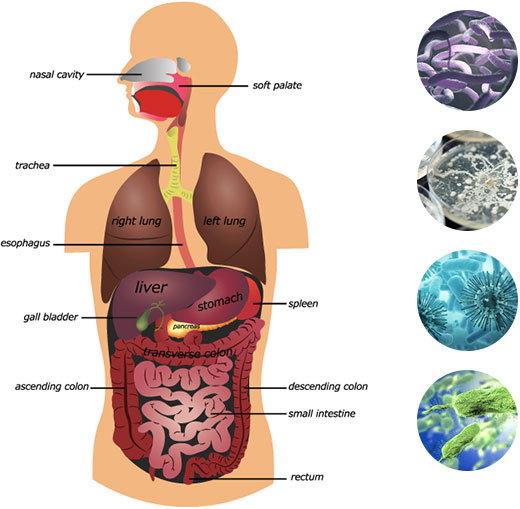Simple things you can do to maintain your gut health
Improving the health of our gut is one of the most effective ways to enhance our overall health and wellbeing.
Gut health relates to the workings of your entire gastrointestinal tract (the tube that delivers food from entry to exit). This involves the digestion and absorption of nutrients, the “leakiness” of our gut, 70% of your immune cells, and many other functions that happen without us knowing.
There’s a community of trillions of bacteria living in our gut, and scientific research has uncovered a whole new way in which we can better manage gut-related conditions and also improve overall health and happiness. In fact this community of bacteria, known as the gut microbiota, is thought to impact many conditions external to the gut, including depression, thyroid disorders, skin conditions, and type 2 diabetes.

Your digestive system is full of good bacteria that help you digest your food and utilize the nutrients. However, poor eating choices and lifestyle habits can lead to an overgrowth of harmful bacteria that inhibits your digestive system from working efficiently. Supplementing with probiotics can help you heal and maintain your gut flora.
What is gut health?
You may have heard the term ‘gut health’ and wonder what it means – surely a healthy gut is just one that digests your food effectively? While this is true, gut health has an impact on the health of your entire body, with increasing evidence suggesting a healthy gut microbiome is important for our mental health, as well as an effective immune system.
Our gut breaks down the meals we eat into a functional form that can enter the bloodstream and go where it is needed in the body. Unfortunately, things can go wrong at several stages in this process, from serious digestive diseases to food intolerances causing problems with how our body extracts nutrients from food..
But what happens when our guts become unhealthy, and how can we maintain a healthy balance? Read on to discover the essentials of good gut health.

Common Signs of an Unhealthy Gut
An unhealthy gut can be tied to various symptoms throughout the body, including:
Stomach discomfort If your stomach is frequently upset by symptoms such as gas, bloating, diarrhea, constipation, and abdominal pain, these can be signs of irritable bowel syndrome (IBS), a common condition that affects the large intestines.
Migraines the gut-brain connection may impact migraines as well.
Fatigue people with chronic fatigue syndrome may have imbalances in the gut microbiome, which consists of the bacteria, microorganisms, fungi, and viruses present in the gastrointestinal tract.
Mood issues There is a well-documented link between the gut and the brain, and the influence of the gut may also extend to your mood. Gut disturbances and inflammation in the central nervous system may be potential causes of anxiety and depression, and that probiotics may help treat these conditions.
Food cravings Eating too much sugar can lead to an abundance of “bad” bacteria in the gut. One way to change your eating habits is by changing what is present in the microbiome.
Autoimmune conditions a particular gut bacteria, called Bacteroides fragilis, produces a protein that may trigger the onset of autoimmune conditions like rheumatoid arthritis, ulcerative colitis, and multiple sclerosis.
Unintentional weight changes Western-style diet high in fat and refined carbohydrates may promote intestinal bacteria that’s linked to obesity.
Allergies an unhealthy gut can play a complex role in allergic conditions including respiratory allergies, food allergies, and skin allergies. Thus, the gut microbiome may influence nutrition, skin, and even the lungs.
f you experience any of these various symptoms, it’s best to get checked out by a doctor to determine if your symptoms are due to an unhealthy gut or other factors. From there, you may also want to visit a naturopathic doctor who specializes in gut health.
How probiotics can help gut health
Before we dive into sources of probiotics and their associated health benefits, let’s understand what they are, how they function, and the mechanism in which they influence other functions in the body.
You will find that you can improve your gut’s bacterial ecosystem (a.k.a. gastrointestinal microbiome) by eating fibrous plant foods, complex carbohydrates, fermented food, and taking the best probiotic dietary supplements.
- Supports healthy gut function and digestive health
- Supports healthy immune system function and a healthy GI tract
- Supports normal microflora in the gut and normal digestion
They have metabolic, antioxidant, and anti-inflammatory properties crucial in maintaining holistic wellness. Gut microbiome converts food to essential nutrients which are vital in all body functions. Probiotics also attach to the mucous membrane of the digestive tract and improve gut immune system capabilities.
Healthy Intestinal Flora!
NOW Foods Probiotic-10 offers a balanced spectrum of live organisms consisting of acid-resistant probiotic bacterial strains that are known to naturally colonize the human GI tract. Probiotic bacteria are critical for healthy digestion, help maintain the integrity of the intestinal lining, support proper intestinal motility and participate in the detoxification process. Probiotic-10 utilizes bacterial strains that have been clinically validated for their support of healthy immune system function
Ingredients
Blend of 10 Strains of Probiotic Bacteria (25 Billion CFU)
Lactobacillus acidophilus (La-14), Bifidobacterium lactis (Bl-04), Lactobacillus plantarum (Lp-115), Lactobacillus casei (Lc-11), Lactobacillus rhamnosus (Lr-32), Lactobacillus paracasei (Lpc-37), Bifidobacterium breve (Bb-03), Streptococcus thermophilus (St-21), Lactobacillus salivarius (Ls-33), Bifidobacterium longum (BI-05) 160 mg
Other Ingredients: Microcrystalline Cellulose, Hypromellose (cellulose capsule), FOS (Fructooligosaccharides), Ascorbyl Palmitate and Silicon Dioxide.
Not manufactured with wheat, gluten, soy, milk, egg, fish, shellfish or tree nut ingredients. Produced in a GMP facility that processes other ingredients containing these allergens.
Refrigerate After Opening To Maintain Potency.
Directions
Suggested Usage
Take 1 Capsule 1 To 2 Times Daily Between Meals Or On An Empty Stomach.
Serving Size 1 Veg Capsule
Servings Per Container 30
Suggested Usage : Take 1 Capsule 1 To 2 Times Daily Between Meals Or On An Empty Stomach.
CAUTION
Consult physician if pregnant/nursing, taking medication (especially immune-suppressing drugs), or have a medical condition (especially if immune system is compromised). Keep out of reach of children.
.
The Secret To A Happy, Healthy Gut Starts Here
This is your gastrointestinal tract, or your GI tract for short.

Cutting-edge research by scientists show that we depend on probiotics living in the gut to produce the serotonin we need to feel happy, focused, and confident.
If you’ve been down or depressed lately, it could be due to a toxic takeover in your gut.
Problems like anxiety, depression, insomnia, and “brain fog”.
As well as, slow or no metabolism, difficulty losing weight, and metabolic syndrome.
And also migraine headaches, itchy eyes, acne and rosacea, arthritis, liver disease and dozens of other conditions.
Can occur when bad microbes kill the helpful probiotics living in your GI tract and begin their toxic takeover of your gut.




Thanks for sharing. I read many of your blog posts, cool, your blog is very good.
Thanks